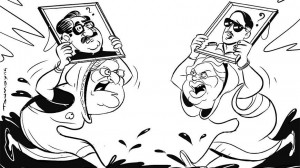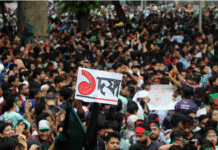Most would say this was inevitable. Two parties with more of a glorious past and a comparatively dismal present were bound to engage in a battle sooner or later to establish their eligibility based on historical references by explicitly discrediting each other.
Bluntly put, the two parties that form the nucleus of our political mainstream today still stand as a testament to some remarkable contributions by two individuals, who at various junctures managed to unite this nation and dared the people to dream.
The Awami League’s initial assault – which entailed an attempt to question the integrity of the slain President Ziaur Rahman as a freedom fighter, patriot, and a leader – has now been countered with a similar rhetoric. The battle lines are drawn now and the level of hostility enhanced. So, what has led to such a unique phenomenon, where the battle for history is overriding the importance of our present and future as a nation?
One would argue that history depicts the ideologies that led to the creation of the AL and the BNP. Hence, it is an attempt to reclaim those ideologies, which have waned over a period of time. It is true that these two political entities came into existence at different times in our history out of necessity, dictated by circumstances. However, the debate that has started is not about the spirit that led to the creation of the BNP or the AL.
The current debate encompasses disproving specific contributions of two historical icons by two opposing camps. The debate is not about the political ideologies that were projected by Bangabandhu or Shaheed Zia. Furthermore, the debate is certainly not about whether these ideologies stand opposed to each other, thus making this a premise merely for mudslinging and slander.
One might also argue that the utter failure of these two parties in lifting the country out of poverty and establishing good governance in more than two decades has led them to resort to their past and to try to re-establish that sense of loyalty and idealism enjoyed by their founding and supreme leaders. However, if this is the sole reason, the fact that it has led to the recent round of controversies can easily lead one to conclude that this strategy has proven to be counterproductive for both sides.
While history can serve as an inspiration, it can never be a substitute for inaction, inefficiency, and incompetence in the present. The manner in which our political mainstream is trying to grasp on to the past to deem themselves to be relevant for the present and the future will only serve them to shy away from formulation of a viable vision, and garner genuine political will to take the nation forward.
As a general citizen sees it, squabbling about history has become a feasible cop out for our political parties. They see it to be a rather inexpensive diversion tactic, which will keep the political arena heated with superfluous debates and controversies in abundance. It will be a disservice to history to say that Bangabandhu Sheikh Mujibur Rahman was not the supreme leader who inspired Bengalis to unite and dream of a state free of subjugation and enriched with the right to self-determination. Shaheed Zia’s announcement of independence on March 27 is also worth its weight in gold because it served to reinforce that consensus.
While Mujib envisioned and inspired the creation of a free state built on socialist principles, Zia, in his short stint as president, brought the people of that very state together to gain recognition as a global producer and a respectable member of the international community. The people of this country are in no illusion regarding their history. Some know it as they saw it, while others have read about it. Ironically, those who claim to carry on the political legacy of the aforementioned leaders by virtue of the political platforms created by them are disillusioned to an extremely fundamental level.
Both Mujib and Zia, beyond reasonable doubt, were leaders who unified the nation, and despite their various flaws, inspired a nation. However, this ensuing so-called battle for history is only dividing the nation at a very elemental level. This is not a battle of ideologies, neither is it a battle for moral high ground. This is a battle for power, where our revered slain leaders have become meagre political capital.
Unfortunately, this unholy battle will continue till our current leaders develop the substance and eagerness to take the country forward. We will wait for that day, but meanwhile, these rather unwanted history lessons are becoming tedious when the electorates are alienated and there are greater things at stake.
Source: UNBConnect











I congratulate the author for speaking the minds of millions of Bangladeshis. As he has correctly pointed out that the self-seeking politicians of both camps are using their respective leaders to whoodwink the nation to get to power and once in power, hide their failures with these conflicting and false bickerings.
We all know how Bangladesh was created and who contributed what. History of Bangladesh is not an anthroplogical discovery something that happened million years ago. Bangladesh happened only 40 years ago, for many of us during our adult lives. We saw it unfold, we saw it happen.
We all know and duly acknowledge the contributions made by both Sk. Mujib and Zia. We know the role played by Mujib in advancing the cause of self-setermination of Bangalees in Pakistan that ultimately led to the movement and to creation of independent Bangladesh.
We also know what Zia did during liberation war and most importantly, during the post liberation period.
Both have made invaluable contributions, each at certain context and juncture of the country. Thus both have not only been relevant.but crucial to evolution of and what is Bangladesh today. To think of Bangladesh what is today with one and not the other, is utterly stupid.
Bangladesh’s existence today as a separate political entity is without doubt, largely a contribution of Mujib and what Bangladesh today as a vibrant economy is largely owing to the pioneering and visionary policies of Zia – evolution of manpower and textile as growth/export sectors, the two mainstay of our today’s economy, for example.
Heinous attempts by riffraff politicians to glorify one at the cost of the other is not only sad but evil.
The least we can do is not pay any attention to these rascals. In this regard, we may urge the media (newspapers, TV talkshows etc.) to impose a complete blackout to these vacuous, wicked and ominously degrading discussions that are not only diving the nation but taking us backward.
Like ADK above, I must congratulate the author for conveying the feelings of majority of Bangladeshis. We were bound to separate from Pakistan one day – it could be years after 1971. If Yahya Khan was not foolish enough to listen to that “Lucifer”, Bhutto, we could possibly have a peaceful separation. Sheikh Mujib was certainly the man of the hour. He was treading a careful path – he wanted to be the prime minister of Pakistan, which was definitely his right being leader of the majority party. We would one day be independent if things did not work out. In that case, we would not be beholden India. Indira Gandhi was a great leader, she got a chance and halved Pakistan and sowed the seed of “division” which is still eating into our nation. Mind you, it was not out of charity. Talk of the burden of 10 million refugees is all cock and bull story!
Since the dull brained Pakistani leadership decided to crackdown on Bengali dissent militarily, the inevitable happened – people resisted. Since there was no leadership in the country at that time – I don’t know of many people having heard the proclamation of independence by Sk Mujib – the call made by General Zia is most significant happening of that time. His call imbued the young generation to take up arms. Denying these facts amounts to denying history. But, I have serious doubt if the rival camps will ever come to terms because politics in our country is controlled by vested interests, psychopaths rule. As far as the media is concerned: they will let the golden goose die. They thrive on these decadent stories. I hope I am wrong for the sake of the country!